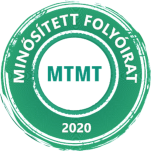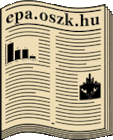About the Journal
Teacher Education and Learning has been one of the most significant educational journals in Hungary for decades. It has always had a unique profile and a strong commitment to creating a forum for professionals in teacher education with a view to enhancing their knowledge sharing and fostering the publication of the current research results of the field. As the journal of the Association of Hungarian Teacher Educators, it is embedded in an organizational context dedicated to supporting the professionalization of teaching.
Building on these strong traditions, the journal was substantially renewed in 2019, when a new editorial board took over. First and foremost, the new editorial board must express its gratitude and respect to Professor Iván Falus. Professor Falus served as the Editor-in-Chief of Teacher Education and Learning from 2002 to 2019, as well as the President of the Association of Hungarian Teacher Educators. Generations of teacher educators have enjoyed his professional support, and he has also played a decisive role in Hungarian educational research. Besides him, there are several other colleagues who were pillars of the former editorial board and are or were respected members of the community of teacher educators: Erzsébet Golnhofer, Judit Koncz Györgyiné, Judit Hegedűs, Anna H. Nagy (†), Györgyné Hunyady (†), Katalin Kéri, Beáta Kotschy, Judit Révész, Ágnes Vámos (†).
We hope that those colleagues who have remained active members of the new editorial board help us to preserve the traditions and build on the achievements of the journal. Our mission is to further nurture those values and traits that have made Teacher Education and Learning unique among educational journals. Among these, the most decisive trait is that it is a professional journal for teacher educators. Teacher educators are professionals who support teachers’ learning and development and thus they constitute a unified professional community. Such professionals, besides their qualifications as teachers of literature or physics, psychologists or educationalists, possess the competencies that are indispensable to be efficient teacher educators (Falus, 2016). We strongly believe that the journal can strengthen the dialogue among an increasing number of such professionals, as well as foster their international networking. However, our scope of interest and responsibility extends to primary and secondary education, as well (see Falus, 2016).
The journal’s name, Teacher Education and Learning, also intends to express that we consider teacher education and teachers’ continuous professional development to be strongly connected. Teachers’ learning is not narrowly understood today as formal pre-service or in-service teacher training, since it has been established that teachers’ non-formal and informal learning also plays a crucial role in their professional growth. Current theories describing teachers’ professional learning are rooted in modern learning theories, the critical analyses of in-service teacher training, and the findings of research into professional development and identity formation. Research findings confirm that pre-service teacher education provides the professional knowledge base and basic toolkit for novice teachers, as well as prove that in the course of their careers, teachers further build their expertise through formal and informal learning alike. These new developments in the field of teacher education prompted us to explicitly espouse a new interpretation of teachers’ professional learning, which comprises the stages of becoming a teacher in pre-service training as well as teachers’ on-going, life-long professional development and learning. In line with this new interpretation, we keep the name ‘Teacher Education’ to honour our traditions, but add ‘Learning’ to it, to make our so far tacit new understanding of the term explicit. In our journal’s approach, this new, extended interpretation of the term ‘teacher’s professional learning’ and teacher educators’ support of such learning will prevail.
In line with the above new interpretation of teacher learning, our list of sections has been slightly modified. Furthermore, since we are also convinced that professional collaboration and cooperation strengthens teacher education, we heavily build on teamwork in our editorial board, and entrusted each section to a pair or trio of editors.
Teacher Education and Learning welcomes submissions to the following sections:
Research Articles welcomes theoretical and empirical research articles that present the current trends of the field. Editors: Magdolna Chrappán, Krisztina Czető and Magdolna Kimmel.
Professional Learning Communities publishes reports of innovations which nurture teachers’ professional growth, innovations either introduced by teacher educators or initiated by professional communities of teachers working in public education. Editors: Judit Hegedűs and Judit Podráczky.
Portraits publishes interviews or reminiscences, aiming to portray those significant persons whose professional activities have had a great impact on primary-, secondary- or higher education. Editors: Nedda Kolosai and Anett Schlichter-Takács.
Reviews aims to help teachers and teacher educators to orientate themselves in the field, and encourages submissions of short critical reviews of recent publications, pedagogical innovations, professional websites, or conferences. Editors: Erika Kopp, and Judit Orgoványi-Gajdos.
Discussions provides an opportunity for professional dialogue on current issues of teacher education. Editors: Beatrix Fűzi and László Horváth.
The new Editorial Board and myself, as Editor-in-Chief, firmly believe that the renewed Teacher Education and Learning will provide solid support for teachers and teacher educators and will enhance their professional development and learning.
Nóra Rapos
Editor-in-Chief







